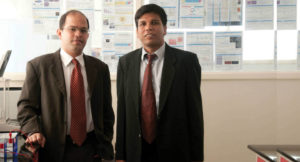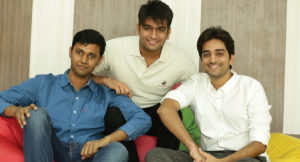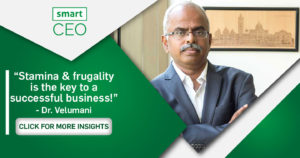Ameera shah, md and ceo of metropolis healthcare, decodes for us key learnings from her entrepreneurial journey, with the benefit of hindsight
POORNIMA KAVLEKAR
Through Metropolis India, Ameera Shah gave an identity to the pathology labs segment in the country. She brought in professionalism and set standards in a sector which is highly fragmented in nature. Her entrepreneurial story started way back in 2001 when she returned from the US at the age of 21. She found a void in the health services market where almost 90 per cent of specific pathology laboratories were fragmented (even today) with zero standards. The opportunity she saw there was a chance to build branded, standardised chain of centres across the country, where each lab caters to a particular locality. As the MD and CEO, she has played a key role in evolving Metropolis from a single pathology lab to a fully integrated multinational chain of 125 diagnostic centres and 800 collection centres across the globe.
In her talk at Startup50, she shares with us some key insights on her journey as an entrepreneur and how she marked the global footprint of Metropolis.
Early days
The first question she was faced with was how to standardise something so local. The second was where does the funding come from? And the third, most discerning issue, was her youth. “The fact that I was in my 20s and a woman raised a lot of doubts in the minds of the investor,” shares Shah. Working in spite of these challenges, she set out to fill the most important gap – that of standardisation.
There were many pathologists across the country who built their brand, relationship with the doctors and the patient, locally in their area. Shah sought this opportunity to bring them under a common umbrella– Metropolis,by acquiring their practices and make them represent the brand in that city. However, it was not an easy task. As Shah shares, “Healthcare is a family business and the pathologists didn’t want an outsider as their son or daughter would continue running the lab.” In the last 15 years, Metropolis has gone from 1 lab to 125 labs and 800 collection centres and in 7 countries. “The initial 5 years were quite slow,” admits she. There was no capital. Apart from salary, Shah ploughed back all the profits back into the business which kept her away from taking debt or private equity, until she knew she was ready. Till 2006, she propelled the company with internal accruals and later took private equity from ICICI Ventures.
Among the many challenges she faced, the key one was convincing pathologists to change the processes.There was no customer centricity then and Metropolis changed that and made service a key factor.
“When we got an opportunity to enter Sri Lanka, I jumped at it as I thought if we are the first ones to go international, it will help us build our brand. People will think this is an international company and therefore quality will be better.”
Global foray
In 2005, Shah got an opportunity to take Metropolis global. During that period, the company was present in only six cities inIndia and had not penetrated India completely. “Then, we got an opportunity to enter Sri Lanka and I jumped at the opportunity as I thought if we are the first ones to go international, it will help us build our brand. People will think this is an international company and therefore quality will be better,” shares she. The reason she felt the need to differentiate this way is because there is no regulation in this industry till date.
A hospital chain asked Shah to partner with them in Sri Lanka and grow the chain across their country. “This was a model which we have never done before, where your customer also becomes your partner,” shares she. There was a lot of complicated dynamics that the company had to address constantly and create new business models to enter new markets. After entering SriLanka, Metropolis entered Middle East and Africa. “We are currently building a chain of labs in Africa like we built in India, as I believe that country is the next frontier in terms of growth,” says Shah. Her belief is that in the next ten to 15 years, Africa will go like how India did in the last 15 years. So Shah is going country by country,setting up space, building a team, setting up systems and really building things from ground up. “Acquisition in our industry is far and few between and there is no inorganic opportunity,” shares she.
MAJOR LESSONS
Careful about your commitments: This is specifically for a young entrepreneur. She learnt that with some power comes great responsibility. “Understanding the level of responsibility actually made me careful about the commitments that Iwas making,” shares Shah.
Focus on the outcome. Look at the end of the destination and focus on the journey along the way. For every startup, the role of an entrepreneur is very different at each stage. For example, in the early stage, the entrepreneur is the soul of the business. “For the first 6 to 7 years, all my strengths and weaknesses were in my organisation. The more we focus on confronting our own fears and figuring our own weaknesses as individuals and overcome them, the better the chance of our organisation overcoming those limitations which has been built into our systems,” says she.
Learn to say no!Opportunities kept presenting themselves. It is important to know when to say no, just as it is to say yes. “When I think back, I took up opportunities thinking that if I didn’t,someone else will and I will lose out. But,is the organisationready for it? Did we have the bandwidth to manage the international expansion and did we have the systems and processes to support it?” reminisces Shah. The challenge of taking on an opportunity that doesn’t work out well is that you may do the business for three years, but you may spend the next 10 years in unravelling the challenges caused by that opportunity. So one needs to understand that it’s ok to wait for a couple of years and needn’t agree to every opportunity that comes your way.
Matter of perspective. All those who become entrepreneurs during their youth mostly lack perspective,which comes with experience. To overcome this, build a team of advisors, mentors and friends who can bring that perspective. “I didn’t do that for a long time. And during this period, I thought my common sense was enough. I get good help today by just reaching out and asking people and it has great impact on the key decision points,” says she. This move will determine the next 10 years of Metropolis.
For Shah this has been a personal passion. “As a woman entrepreneur in India, the journey is different from a male entrepreneur due to social conditioning in the country,” she explains. Shah is in the process of building a platform for women entrepreneurs keen to grow their business and who don’t have financial, emotional support, mentorship or guidance on how to face the challenges. “But the journey in the last 15 years has been incredible. I wouldn’t trade it for anything.To me the most exceptional part is how much I have learnt about myself,” says Shah.
KEY TAKEWAYS
Show quality consistently
Your customer is your partner
Some major lessons: commit carefully, focus on the outcome, learn to say no, rope in advisors




